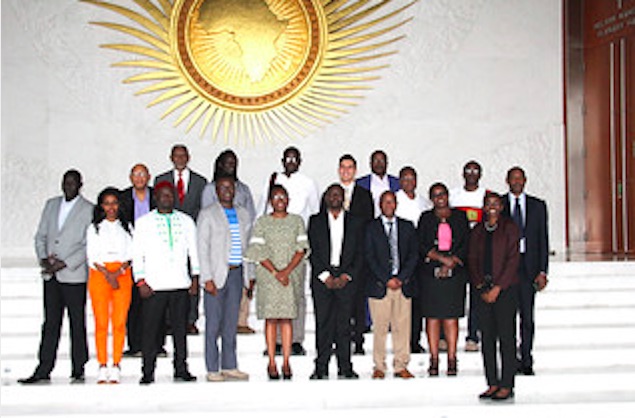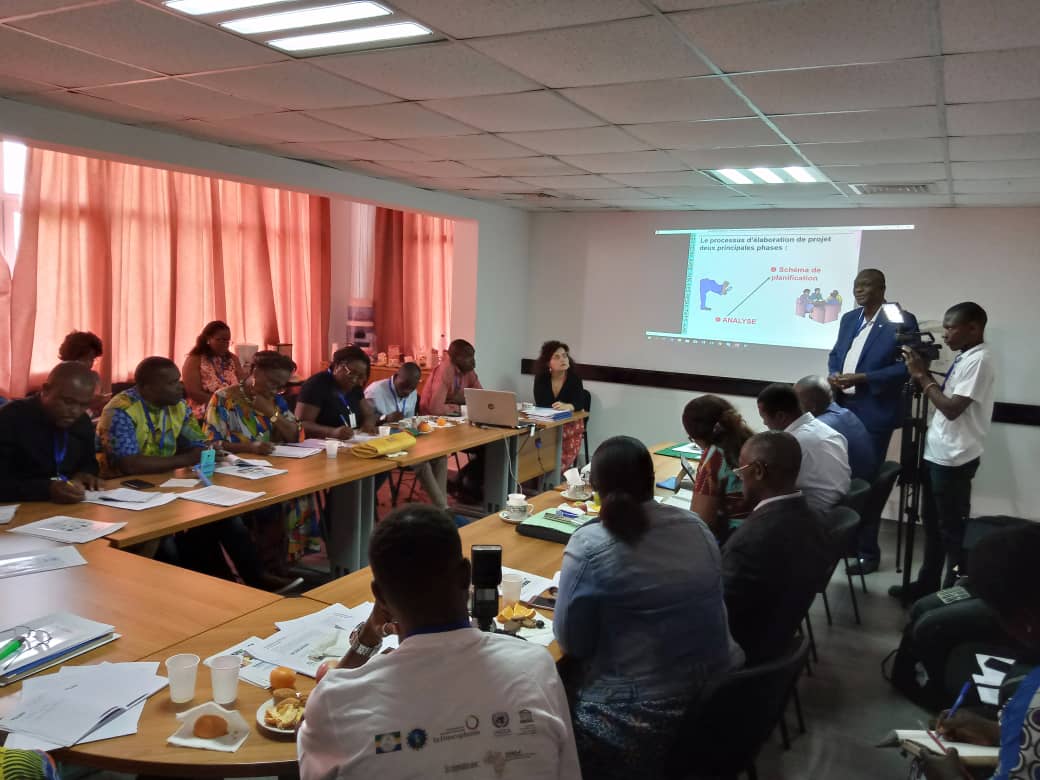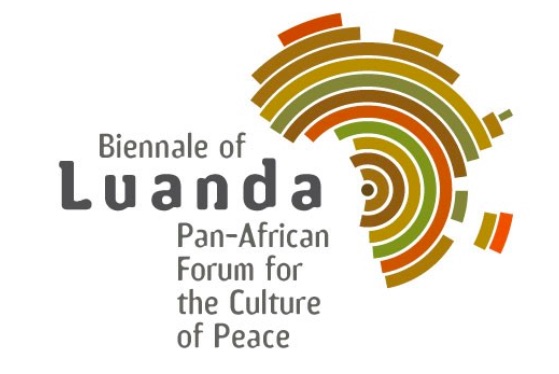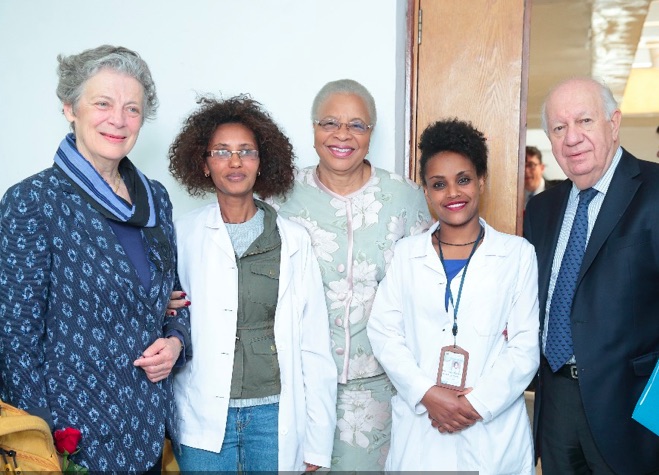. . WOMEN’S EQUALITY . .
Articles from the Nobel Women’s Initiative and Peace People
From April 30 – May 3, emerging leaders from more than twenty countries came together in Monrovia, Liberia for Claiming Our Space: Emerging Feminist Voices for Peace—a groundbreaking summit co-hosted with Nobel peace laureate, Leymah Gbowee, and the Gbowee Peace Foundation Africa. And — spoiler alert — it was awesome!

(Click on image to enlarge).
For a detailed recap of the event, read this blog post from one of the participating emerging leaders, Louise McGowan, who reflects on her experience in Liberia!
Just last week, the Nobel Women’s Initiative along with the Gbowee Peace Foundation Africa brought 50 women from over 20 countries together in Monrovia, Liberia to discuss feminism, power, activism and peace. The title of the conference was “Claiming Our Space: Emerging Feminist Voices for Peace” and over three days of multigenerational talking, engaging and sharing, women from North, South, East and West learned from and inspired one another.
On day one of three, the five Nobel Peace Laureates present (Leymah Gbowee, Shirin Ebadi, Jody Wiliams, Rigoberta Menchú Tum and Tawakkol Karman) shared some of their experience and offered advice for young, ‘emerging’ feminist leaders. The overarching theme to kick off the convening was that we (women) are powerful and worthy; that we must claim our space, we must use our voice and we must not ask for permission to do so.
“No one will give you space, you have to claim it yourself.” Leymah Gbowee
Tawakkol raised the important issue of women’s roles in a post-conflict setting. “As you lead the revolution, as you lead the struggle against war, women should be there to fight corruption, to fight injustice and to fight for equality.” Our space is not temporary or negotiable.
“My message for young people is to go forward, raise your voice, say what you want to say and we laureates will support you.” Shirin Ebadi
Through speeches, panel discussions and youth-led conversations, a number of important topics were broached over the course of the day such as: The Liberian Feminist Peace Movement; Conflict, Migration and the Diaspora; and Gun Violence and Militarisation. One might be forgiven, perhaps, for thinking that this was not the gentlest of introductions, however it should be noted that the group of women attending this conference are the embodiment of power and boldness. This is a group who will not and does not wish to shy away from difficult questions. This space provided an opportunity to explore “what is grounding us, inspiring us, what feminist leadership looks like now and what could it look like in the future?” Mikaela Luttrell-Rowland
As Rigoberta Munchú Tum stated, we must “give ideas to ignite passions of other people so that they can solve problems as well” and this day was about reminding ourselves of the importance of walking your talk (Leymah Gbowee). Many words uttered during these discussions were inspiring but more than that- feeling the strength emanating from the speakers was overwhelming. When Shroq Abdulqader Al-Qasemi spoke of turning pain into power, as a participant I felt the true value of this exchange in my soul.
(Article continued in the right column)
Question for this article
Do women have a special role to play in the peace movement?
(Article continued from the left column)
On the second day, the convening opened with eloquent spoken word from Neuteyshe Felizor and a mighty key note address from Shirin Ebadi. Following this, a panel tackled ‘decolonising feminist leadership’, unpacking cultural origins of both feminism and leadership in the process and arriving at the conclusion that power is in and of itself a colonial concept. Sometimes we have to look back to move forward. This fed directly into the subsequent youth-led discussions with two of our laureates, addressing Gender-based Violence with Leymah Gbowee and Conflict and Natural Land Resources with Rigoberta Menchú Tum. Both conversations highlighted the importance of alliance-building; tapping into different networks on a local and global scale. This emphasised to me the power of both the global feminist movement and of the individual embracing their strengths and using available resources.
After a well-earned break, the collective reconvened for breakout sessions with young feminists given space to reveal their experiences. Case studies from countries such as South Sudan, Cameroon, Colombia and Northern Ireland were discussed, and lessons learned shared. This afternoon offered an opportunity for comparison, empathy and understanding alongside ideas for strategising in a diverse range of settings. As the day drew to a close, the feeling in the (very well air-conditioned) room was that we were building important alliances in this moment.
The third day was one of joy. The plenary to start was on ‘caring for ourselves and the movement: is it even possible?’ and Felogene Anumo opened the day appropriately: “It’s said you can’t pour from an empty cup. How full are you?”.
The first session’s aim was to deepen our reflection and share knowledge of self and collective care, wellbeing and healing as critical components in our struggles for rights, justice and peace. We heard from Jody Williams and Rigoberta Menchú Tum on how they look after themselves and how they continue to do the work that they do. Jody mentioned how easy it is to feel overwhelmed by urgency and righteous indignation, however with time she has learned the value of granting herself personal time and space. By exposing their own humanity and vulnerability, these powerhouse women let the young people in the room know that it’s ok to not feel strong sometimes.
Rigoberta raised the issue of our own agency; that we manage our “own energy and strength” and that “none of us can survive on goodwill alone”. This struck a chord with many of the feminists in the room who have at times felt the weight of external expectations as well as self-inflicted pressure. We were reminded that we have control over some of our pressures. Yah Parwon also spoke of finding ‘what is relevant’, leading us to think about what serves the individual; yoga might not work for everyone.
After starting the engine with the introductory panel, we shifted into gear with interactive sessions. These offered insight into Reimagining Women, Power and Movement-building; Radical Self-Care; and Intergenerational Trauma. The latter involved a moving exercise for understanding intergenerational trauma in a tangible way. All participants felt the physical weight of previous generation’s experience and hardship. The group discussed practices and rituals for addressing and letting go of trauma as well as welcoming knowledge, heritage and positive energy into our daily lives.
The Final plenary entitled ‘What’s the point of the Revolution if We Can’t Dance’ was a joyful and poignant close to our conference. Aptly, the session began with actual dancing and laughter. The panelists shared ways to centre happiness and pleasure in our movements. A crucial part of ‘claiming our space’ is finding ways to enjoy our space. With little detail spared, this open and honest discussion reaffirmed why each person exists and why each participant was present. Acknowledging that pursuing peace can be painful and hard, Leymah stated: “A brand-new sponge absorbs water and all the dirt that comes with it. We are the sponges and we need to find space to squeeze out.”
In the spirit of self-reflection, learning and solidarity participants were invited to make a commitment to themselves in relation to their own feminist leadership, to multigenerational organising and/or building communities of care. The conference was closed with intentions set and mood high. I for one felt more ‘full’ than I had when it had opened.
(Thank you to Janet Hudgins, the CPNN reporter for this article.)









